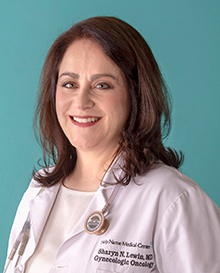Contact Us
Each year, nearly 14,000 women are diagnosed with cervical cancer—but the good news is that this disease is now highly preventable. September is Gynecologic Cancer Awareness Month, so it's the perfect time to talk about some of the things you may not know about the disease.
Cervical cancer is most often caused by HPV (human papillomavirus)
HPV is the most common sexually transmitted infection in the United States. It’s estimated that nearly everyone who’s sexually active will end up with at least one strain of HPV at some point. Most HPV cases are harmless and go away by themselves without treatment, but a few types can lead to cervical cancer in some women.
Cervical cancer takes years to develop
Abnormal cells from HPV can lead to cervical cancer, but the disease can be prevented if changes in the cervix are found early and then treated. That's why a Pap screening test is important; it can find those abnormal cells before they become cancerous. Pap screen testing should begin at age 21. Women should see their gynecologist every year and discuss when and how often you should have a Pap test. Experts base screening guidelines on your age and risk factors for cervical cancer.
Cervical cancer can develop without causing pain or other symptoms
In early stages, cervical cancers and cervical precancers won’t cause pain and can go unnoticed. That's why it's vital for women to get annual pelvic exams and Pap tests to detect cancer in its earliest– and most treatable– stage. The first identifiable symptoms of cervical cancer are likely to include:
- Irregular vaginal bleeding
- Pain during intercourse
- Unusual vaginal discharge
- Pelvic pain
The HPV vaccine helps protect against cervical cancer
The HPV vaccine protects against infection from certain types of human papillomavirus, including those high-risk strains shown to cause cervical cancer.
"The good news is that we are living in a time when there is a vaccine that can prevent cervical cancer," says Dr. Sharyn N. Lewin, gynecologic oncologist at Holy Name. "I recommend that all parents consider this potentially life-saving treatment and educate their children on the importance of not only preventing disease, but of maintaining health."
The U.S. Food and Drug Administration recommends both females and males get vaccinated up to age 26, before they have been exposed to the virus to prevent HPV and cervical cancer later in life. However, people up to age 45 can get vaccinated too. Although it may not be as effective as it is in those who get the shot when they are young, it can provide some protection against cervical cancer. Talk to your doctor for specific HPV vaccination recommendations for yourself or your child.
The experts at Holy Name Cancer Care are here to answer your questions about cervical cancer prevention and treatment. To learn more or to schedule an appointment with a gynecologic oncologist, call 201-227-6200.


